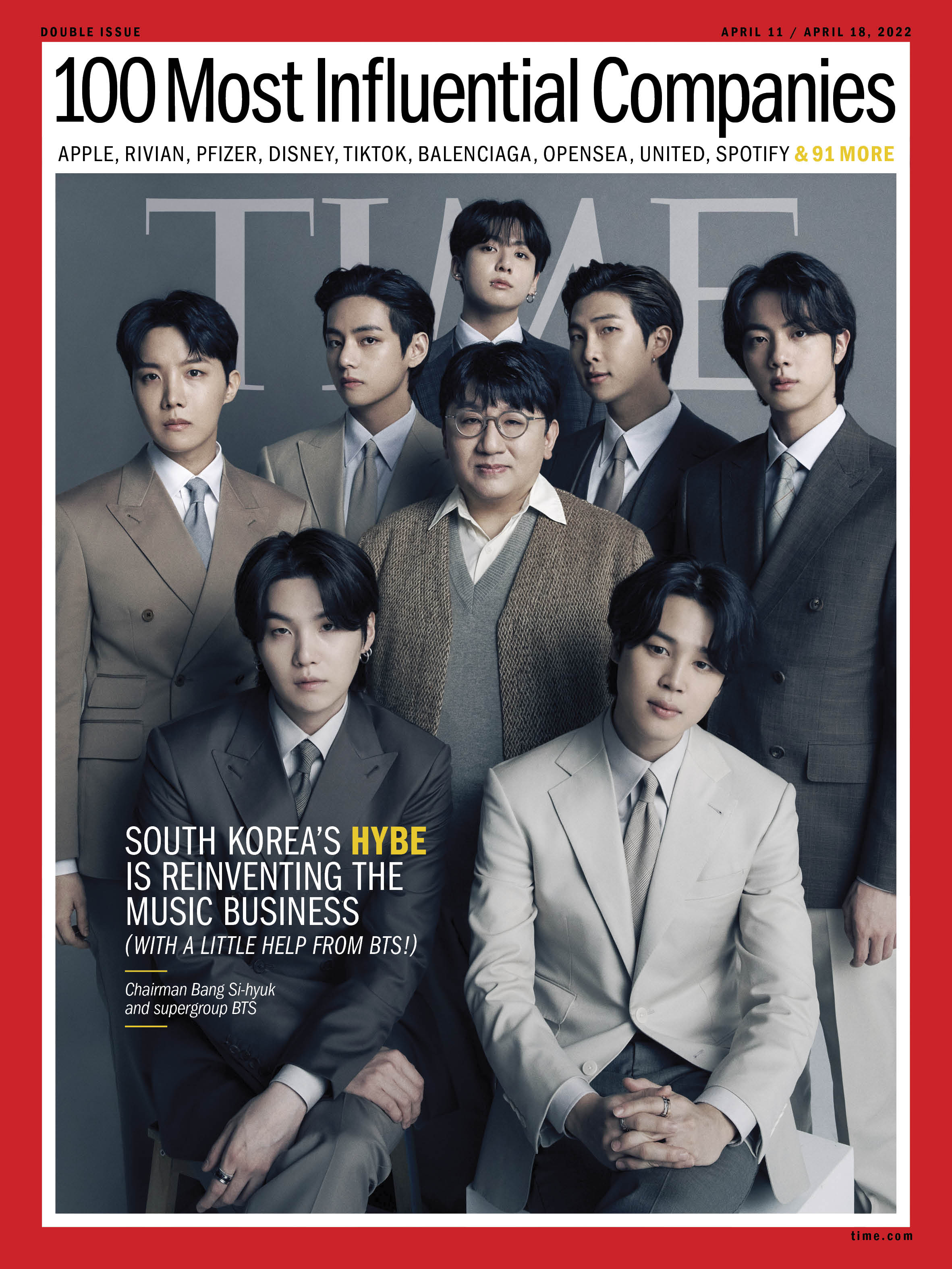This April, Las Vegas might feel a little different. For two weekends, the stars of South Korean supergroup BTS will play concerts to sold-out audiences at Allegiant Stadium, filling the city with tens of thousands of passionate fans of their brand of high-energy K-pop. It’ll be a return to live-performance form for BTS, whose global touring schedule has been mostly stalled in the face of the pandemic. Despite the setbacks, the group has thrived. That ongoing success is a direct product of the shrewd management agency behind the world’s most popular musical act. Initially founded as Big Hit Entertainment in 2005 by musical mastermind Bang Si-hyuk, the company listed publicly on the Korean exchange in 2020 as HYBE; it’s valued at $9.5 billion today. And while BTS takes the stage in Vegas, HYBE will also host auditions there, on the hunt for the next decade’s stars.
HYBE is not just a record label or a management company. “HYBE’s vision has always been ambitious—to the point of being presumptuous,” says Bang over Zoom from its headquarters in Seoul. (It also has bases in the U.S. and Japan.) “Our vision is to become the world’s leading entertainment lifestyle platform, with music as our foundation.” A former artist himself, nicknamed Hitman for his surefire musical instincts, Bang is thoughtful and earnest in his answers—even as he is bold in his goals. These days, he prefers a behind-the-scenes role, and has handed over CEO duties to Jiwon Park while he remains the company’s chairman. As HYBE has evolved, it has grown from a small artist incubator—Bang handpicked the seven performers of BTS from around Korea—into what he calls a “360-degree business,” in the mode of brands like Disney that own and operate a catalog of intellectual properties (IPs). Over the past year, HYBE acquired U.S.-based media company Ithaca Holdings—which manages the likes of Justin Bieber, J Balvin, and Ariana Grande—for over $1 billion, invested over $420 million in a crypto venture, and scaled up business in Japan and the U.S. It also runs Weverse, a fan-to-artist social media app with nearly 7 million monthly users. “We are in a stage where we have expanded the boundaries of our industry itself,” Bang says.

Get a print of the 2022 TIME100 Companies cover featuring BTS here
HYBE consists of three sectors: artist IP, technology, and world building. BTS leaned on all of that infrastructure to find a new path to global dominance even in lockdown. “The idea was to release new music to console people and heal their minds through our music during these hard times, when it’s difficult to physically meet and interact,” BTS leader RM tells TIME. “The results were ‘Dynamite,’ ‘Butter,’ ‘Permission to Dance.’” Each of these upbeat, dance-ready singles, released strategically over the course of two years, became record-breaking hits and solidified BTS’s place in the pop firmament. BTS has been, Bang says, “the king of the K-pop scene for a very long time,” but HYBE’s newer acts, including ENHYPEN, TXT, and SEVENTEEN, are on the brink of breakout moments themselves. Plus, HYBE is prioritizing launching fresh talent out of Korea, Japan, and especially the U.S. “The essence of our company is IP—we are a music business company. We need to make our IPs bigger and also create more,” Bang says.
Where HYBE has differentiated itself is in investing in technology that makes it possible to stream concerts virtually and own the artist-fan relationship, from ticketing to merchandise shops to live artist broadcasts, shows, and message boards. Weverse, where fans can go for all things related to HYBE artists, is what Bang calls a “great innovation.” HYBE also recently acquired VLIVE, a tech platform that allows for live video streaming to audiences.
Read the interview: HYBE’s Bang Si-Hyuk Explains His Vision For the Company Behind BTS
That technology, RM says, carried the group through the disappointment of canceled tours and kept their fans engaged. “During the pandemic, the company put together online concerts and has been building the fan communities [around the world],” adds BTS member Suga. The group’s virtual concerts, streamed to over a million paying ticketholders worldwide, broke records for live viewership. It was HYBE that owned and operated the virtual platform for them to perform, and HYBE, in which the members of BTS are shareholders, that reaped the rewards. VLIVE is currently being integrated into “Weverse 2.0,” set to release in the first half of this year.
But Bang recognizes that one innovation isn’t enough. “The market is constantly telling us to come up with something new already,” he says. So he did. One of 2022’s rising market trends in music is the sale of NFTs—nonfungible tokens that exist on the blockchain—of songs and other assets, like tradable photocards of artists. In late 2021, Bang announced HYBE would pursue building an NFT exchange of its own as a joint venture with fintech company Dunamu. But fan backlash was quick, with concerns about such tokens’ environmental impact. “All I’d like to say to fans is, as of now, we haven’t announced anything,” Bang now says. The point of the proprietary exchange, he says, is to have greater control over how NFTs are created and distributed—and to address fans’ concerns directly with “policies and technical measures” that would better reflect their priorities. He is cryptic for now, but seems bullish on the future of NFTs for his artists. “We have some interesting projects in the works,” he says, adding that the result may persuade skeptics who are now saying, “These guys don’t understand why we hate this.”

The NFT question is just one piece in Bang’s vision of a new, better-functioning business model for artists. One of the primary challenges in the global music industry is the tension between artists, labels, and streaming platforms for fractional payouts. Bang’s method of evading that minefield is to diversify HYBE artists’ income streams. “While contemplating questions like: ‘How can we satisfy fans and expand the artist’s reach, and at the same time create a longer life span for music through narrative structure?’ we came up with a new model last year,” Bang says.
It’s called the “Original Story Business,” through which HYBE is developing everything from animated cartoons to Korean-language educational materials that all connect to the music, message, and personalities of HYBE artists. So far, the company has announced three projects in collaboration with Naver Webtoon, with at least three more to come this year.
“Our company structure is so unique,” Bang says; it’s able to capture revenue from multiple points. That’s a contrast to many other labels. “The music industry is losing quite a lot in the value chain. I feel the music industry should be making a lot more money and their value as a service should be recognized more,” he says, referring to the artists’ work. “Mr. Bang and HYBE have always prioritized the essentials—the music,” says BTS member J-Hope.
Meanwhile, HYBE’s model has already irrevocably altered the global music landscape. “In a lot of cases people just do things because that’s the way things have been. I have a hard time accepting that,” Bang says. “And so in running a company, I always try to focus on: Why are we doing this?”
For BTS, that meant ignoring the limitations placed on earlier K-pop groups and establishing themselves as the princes of global pop. For HYBE, it means evolving as a music agency, a tech innovator, and a creative powerhouse all at once. Bang, like BTS, has always dreamed big. So why is he doing this? Well, why not?
Read the interview: HYBE’s Bang Si-Hyuk Explains His Vision For the Company Behind BTS
A weekly newsletter featuring conversations with the world’s top CEOs, managers, and founders. Join the Leadership Brief.
- Dua Lipa Manifested All of This
- Exclusive: Google Workers Revolt Over $1.2 Billion Contract With Israel
- Stop Looking for Your Forever Home
- The Sympathizer Counters 50 Years of Hollywood Vietnam War Narratives
- The Bliss of Seeing the Eclipse From Cleveland
- Hormonal Birth Control Doesn’t Deserve Its Bad Reputation
- The Best TV Shows to Watch on Peacock
- Want Weekly Recs on What to Watch, Read, and More? Sign Up for Worth Your Time